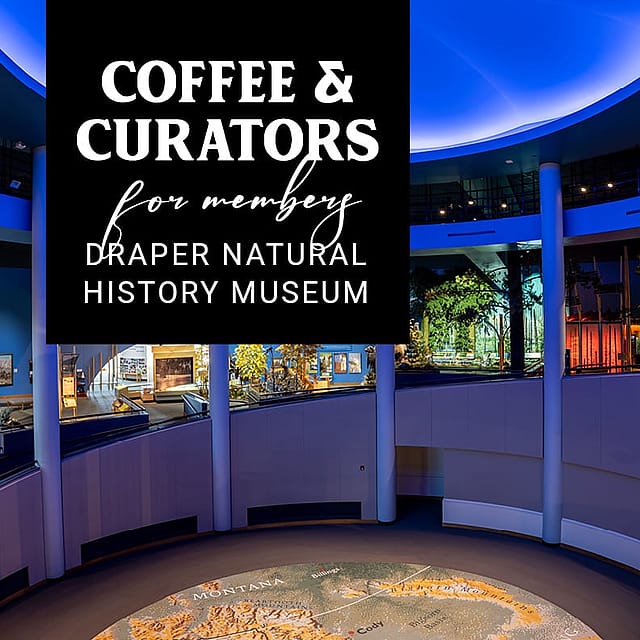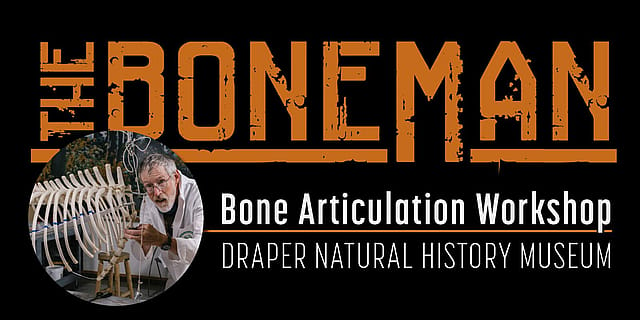
- This event has passed.
Lecture: Corvids, conifers, & the pinyon jay
February 1, 2024 @ 12:00 pm - 1:00 pm MST

Corvids and Conifers: The unusual case of the pinyon jay

By Corey Anco
February 1, 2024
Noon–1 p.m.
Free
Join us for our first Lunchtime Expedition of 2024, Corvids and Conifers: The unusual case of the pinyon jay, presented by our own Draper Museum Curator Corey Anco.
The in-person talk takes place in the Center’s Coe Auditorium, with a virtual option available. If you prefer to join us online, you may register in advance via Zoom webinar: https://us02web.zoom.us/webinar/register/WN_uvO66q_mQSuyyW-jvDhZ5g
After registering, you will receive a confirmation email containing information about joining the webinar.
About the program
Intended as an insult, the expression “bird brain” is generally used to refer to someone with limited intelligence. But are birds really that simple-minded? Hardly! This expression is a disservice to this incredible and diverse class of organisms.
The pinyon jay (Gymnorhinus cyanocephalus) belongs to a particularly intelligent group of birds comprising the Corvidae family, which includes crows, ravens, magpies, and jays, among others. The pinyon jay is named for its close association and dependency on the pinyon pine, however, while northwestern Wyoming supports pinyon jays, pinyon pines are not found this far north. How did this close relationship between corvid and conifer develop and how does the pinyon jay survive without the pinyon pine? In this talk, we provide a bird’s eye view of the unique suite of characteristics and strategies that pinyon jays evolved to respond to changing pressures and conditions. This presentation will provide an overview of research on the pinyon jay, and set the stage for a new study taking flight in 2024 by the Draper Natural History Museum and collaborative partners.
About the speaker
Corey Anco became the Willis McDonald IV Curator of Natural Science for the Draper Natural History Museum in November 2022, after having served as Interim Curator since January of 2022. He joined the staff in August of 2017 as Assistant Curator. Before coming to the Draper, Corey pursued opportunities with the U.S. Forest Service, U.S. Fish and Wildlife Service, U.S. Geological Survey, and National Geographic Society’s Big Cats Initiative. Fieldwork experience ranges from tallgrass prairies of the Midwest and tundra of the Alaska Peninsula, to immersion in Neotropical rainforests in Belize and the concrete jungle of New York City fostering a comprehensive exposure to wildlife responses following habitat disturbance. Anco also has extensive experience in teaching ecology and communicating science to youth groups, high school, and undergraduate students with the Wildlife Conservation Society. He is a Certified Interpretive Guide through the National Association for Interpretation.

Academically, Anco earned a Bachelor of Science from Lewis University, Master of Environmental Management from Duke University, and Master of Science in Biology from Fordham University. He also holds certifications in geospatial analysis and chemical immobilization of wildlife. While attending Fordham University, Anco studied the phylogeography (geographic distribution of genetic lineages) of African leopards (Panthera pardus) using mtDNA he recovered from leopard skulls in the American Museum of Natural History collections. This research provided a much needed and updated reference benchmark of genetic diversity of the African leopard.
Anco’s approach to the long-term preservation of wildlife interweaves themes of ecosystem rewilding, partnership building, and responsible land stewardship. His interest in joining the Draper Natural History Museum stems from his experience in working with museums and their collections to inspire and promote understanding, appreciation, and conservation of wildlife and wildlands.
Upcoming Lunchtime Expeditions
The series generally continues on the first Thursday of each month, but please note: there will not be an April lecture this year.
• March 7: Wildlife Photography in the Greater Yellowstone Ecosystem: Biodiversity, Human Interactions, and Ethics by Julia Cook
• May 2: Large Carnivore Management in Wyoming, by Luke Ellsbury
• June 20 (note date change): How the Largest of the Largest Dinosaurs Came to Be, by Dr. Michael D’Emic
• July 11 (note date change): Global Warming in the Bighorn Basin 56 Million Years Ago, by Dr. Scott Wing
• July 12: Bonus lecture! Human-Environment Relations from Different Perspectives: Findings from Collaborative Research of Indigenous Peoples and Swiss Anthropologists
• August 1: Voyagers of the Night: Investigating the Ecology of Bats in the West, by Dr. Riley Bernard
• September 5: A Specialist Carnivore at its Southern Range Periphery: Canada Lynx in Disturbed Landscapes, by Dr. John Squires
• October 10 (note date change): Sporting Lead-Free: A Vital Step for Wildlife Conservation, by Hannah Leonard
• November 7: Wolverine Conservation: Giving Up Control to Promote Breeding Success, by Melissa Roman
• December 5: Mule Deer Migration, by Tony Mong
Have you missed a Lunchtime Expedition?
The talks in this series are gathered in YouTube playlists by year:
• 2024 Lunchtime Expeditions
• 2023 Lunchtime Expeditions

